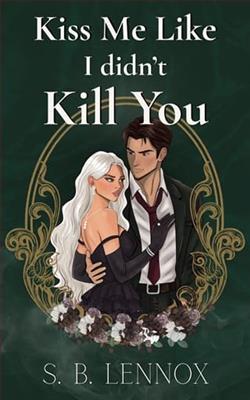Page 2 of Casanova LLC
I turned right, down the hall, into the two-story foyer. Looked to the left.
And there he was.
Leaned against the threshold, ankles crossed. One hand held a tail of his gray scarf, the other ran through his hair. His comfort, obvious. He watched two movers pass by him on their way to the elevator, carrying a swaddled statue between them. They could have been removing a body. As I walked toward him, he languidly bumped off the doorway, buttoned his sports coat, and effortlessly smiled at the movers. When I stopped walking toward him, he turned to me.
It was five years ago. The same moment. I couldn’t stop looking then and I couldn’t stop now. I felt like the silly schoolgirl I’d never had the luxury of being. But you have to understand: his eyes.
They weren’t just beautiful. That would make it easier. They were transportive. They took hold and traveled me. Into another age. Another time. Another person.
Five years ago, that had terrified me.
Now?
“This is your meeting?” I heard behind me. Ms. Sotheby. I turned to her and she was looking at him exactly as her tone implied: pure objectification. The wavy dark hair, Roman nose, warm olive skin, blue eyes framed by lush black lashes, a strong brow, and a tanned neck disappearing into that gray scarf.
I glimpsed how she’d tell this story. “He’s just a?—”
“I’ve come to pay my respects.” His voice confirmed everything she was imagining about him. The tone was low, masculine, but so grave that it reminded her—and me—of the seriousness of the current situation. Why we were all here.
She stuck out a professional hand. “Caroline Summers, Sotheby’s.”
He took it. “Alessandro Vianello.”
“Well.” When he released her hand, she used her other one to soothe it. “Don’t mind me. I’ll just be in and out, quiet as a mouse.”
His eyes were already back on me. He stepped toward me. I stiffened. His hand lifted?—
“Vianello. Why does that sound familiar?”
His hand dropped.
“He’s a painter.”
“Ahhh.” But I could tell that wasn’t it. Then she mumbled something about it would come to her and she was off, barking a command at a mover.
We looked at each other again.
My hand loosened itself from my body and extended toward him. But just then the contractor walked into the center of the foyer, explaining to the plumber how they were going to blow out this side wall right here and put in a water feature. My hand fell.
I gestured for him to follow me. I walked to the library, but someone was in there boxing up books. Books, as far as I knew, no one had ever touched, let alone read. I headed for—and he followed me to—the soon-to-be-demolished staircase. As we ascended, I saw yet another worker on the landing, measuring the dimensions of the loft, which had been our sitting room. Where we never sat.
I glanced left and saw that my bedroom was free. No one was working in there. We could have privacy, in there. In my bedroom.
No.
I opened a pair of French doors and stepped out onto the roof deck.
The Hudson glistened beyond the railing to our right and lower Manhattan was spread out before us. The February midday sun was high. It hadn’t snowed for a week. It was pleasant enough.
I walked to the built-in glass fireplace and turned it on. For atmosphere as much as for heat. All the utilities had already been transferred to the new owners, that was part of the deal, so at least there was gas.
I saw the covered patio furniture and remembered that I needed to tell Ms. Sotheby’s—Caroline, had she said?—about it. Designer of some kind. I moved to it, lifted a corner of one of the chair covers. His voice stopped me.
“That won’t be necessary.”
“I thought we might sit.”
“No need.”















